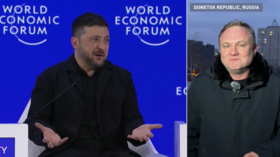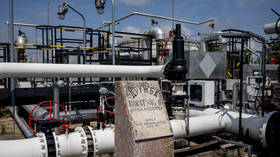Greece’s impossible choice shames Europe
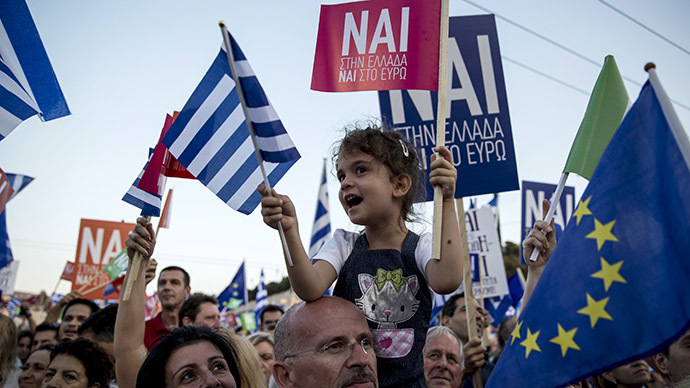
When you continuously kick a can down the road, one day the receptacle is so battered that it can be propelled no more. That day has finally arrived for the EU and Greece. Whatever the outcome of today’s landmark vote, Europe will never be the same again.
If the Greek people say yes, the EU’s peripheral states will be consigned to German domination. This is not necessarily always a bad thing. There is no doubt that many of the world’s more unstable nations could do with becoming a little more German.
Nevertheless, while being economically strapped to Berlin is mostly beneficial for well-run countries like the Netherlands or Austria, it’s a complete disaster for the likes of Greece or Portugal.
Southern Europe, from Lisbon to Athens, via Belgrade and Rome, prospered in the post-war decades. The reason was pretty prosaic. These nations, which could devalue their currencies to their hearts content, were part of the world’s largest market-place, Europe.
After Italy first joined the then EEC (initially the Coal and Steel Community), favorable access to German and French markets allowed the country to thrive like never before. Inspired by Rome, Portugal, Greece and Spain demanded entry after jettisoning fascist and military regimes. So too, did other non-core European countries like Ireland and Finland. Even the British, who had originally dismissed the alliance as a club for “German-speaking Catholics,” had signed up by 1973.
At the time of the first tentative negotiations, all three main players (France, Italy and Germany) were indeed led by German-Speaking Catholics. Robert Schuman of France was originally a Luxemburger, Italy’s Alcide De Gasperi was born into the then Austrian-controlled Tyrol and West Germany’s Konrad Adenauer hailed from a staunchly Catholic family in Cologne. This alienated the largely Protestant British, led by Foreign Secretary Ernest Bevin – a Baptist lay preacher – who according to the historian John Charmley had difficulties with reading and writing in English, let alone German.
The birth of the euro
As the EEC became the European Union, the euro began to take shape. The attraction of the single-currency to peripheral European states was obvious. It offered cheap, easy credit and guaranteed exchange rates to countries that had previously experienced cripplingly high-borrowing costs and serial currency devaluations.
Take Ireland as a case in point, While Dublin used its independent Punt, I distinctly remember interest rates of between 15-20% making life very difficult for businesses and mortgage holders. The sovereign also frequently found it impossible to raise cash on international markets without paying extortionate rates. As soon as Ireland was locked into the eurozone, interest rates plunged to negligible percentiles and, awash with cheap credit, a frenzied (ultimately bananas) construction boom seized the nation.
Just for some context, so crazy were things by 2005 that my friend Ronan ditched his comfortable job as a History and French teacher (salary about €45,000 annually) to work as a block-layer. For a few years, he earned between €400-600 a DAY as a brickie. After the 2009 Great Financial Crash, laden down with unplayable debt, he ‘did a runner’ to France where he now, ironically, works as a school ‘handyman’ for €300 a week and gives English lessons on the side.
Greece (and Ireland and others too) essentially emulated Ronan on a far grander scale. With cheap money sloshing around, they allowed the pillars of their economies to rot and climbed aboard the speculation train like ‘90s ravers on MDMA. Athen’s wealth had been based on Greek control of much of global shipping and a tourism industry which was the envy of the world. The euro era saw productive capital from these sectors diverted to gambling on property. They all might as well have placed all their money on the favorite in the 4.30 at The Curragh. If the horse lost, they could have at least have gotten some small pleasure out of watching the race.
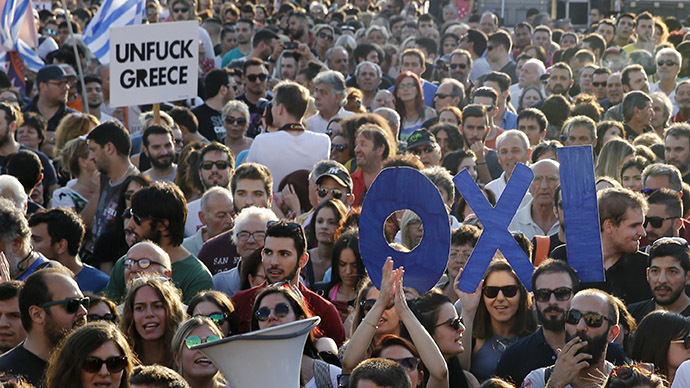
A misguided genius?
Most analysts ‘credit’ Francois Mitterand with ensuring the birth of the euro by forcing Germany to agree to the currency in exchange for French acquiescence to Germany’s reunification. This is not the full story. The ‘evil genius’ behind the euro was actually a Canadian called Robert Mundell. Indeed, the root of Greece’s current predicament lies in the politics of Margaret Thatcher and Ronald Reagan, not the Paris-Berlin horse trading of 25 years ago.
Professor Mundell, who, despite now being 82, still teaches in New York and Hong Kong, laid the groundwork for the euro. He also helped found the supply-side economics movement beloved of neoliberals. According to the journalist Greg Palast, Mundell believed that “the euro would really do its work when crises hit.”
Mundell apparently boasted: “It puts monetary policy out of the reach of politicians, (and) without fiscal policy, the only way nations can keep jobs is by the competitive reduction of rules on business.” Palast adds that, “for him (Mundell), the euro wasn’t about turning Europe into a powerful, unified economic unit. It was about Reagan and Thatcher.” Hence, when crises arise, economically disarmed nations have little to do but wipe away government regulations wholesale, privatize state industries en masse, slash taxes and send the celebrated European welfare state down the drain.
Of course the great European project is also profoundly undemocratic. Its execution is designed to force the electorate into a position to which they did not consent, and from which the only escape is ‘more Europe.’
Merkel’s failure
Angela Merkel knows this too. For this reason, she has booted the bucket down the Autobahn for years. The preacher’s daughters only concern during the years of this crisis has been to pray that neither the EU nor the euro will break up on her watch. Merkel is not a pro-Brussels ideologue. In fact, she’s a consensus politician who rules by opinion polls, rarely taking strong positions. Merkel’s surveys of the German people tell her that bailing out Greece is not a popular option. So Angela Merkel is opposed to extending a lifeline to Athens. If the Bild tabloid suddenly changed tack and supported the idea of debt-relief for Greece, Merkel most probably would also do a U-turn.
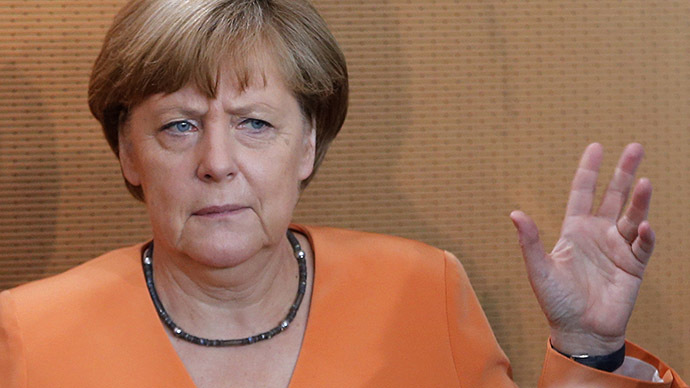
Since the first signs of a European fiscal crisis, Merkel has espoused a doctrine of austerity for the entire periphery, with no significant debt relief. Of course, neither the Chancellor nor her Eurocrat devotees in Brussels have ever explained what will happen when everybody completes their austerity program. If everyone becomes ‘more competitive’ then how do any of the fringe EU states gain an advantage?
Naturally, Merkel’s non-confrontational style of rule has more-or-less led to today’s make or break vote. As any amateur psychologist could explain, long-fingering traumatic issues generally lead to them all coming to a head at the same time. Even Hamburg’s Der Spiegel, recognized as a strongly pro-neoliberal and Atlanticist organ, has accepted that Greece needs German help. Once described as “Scheißblatt” (shit paper) by the leftist creator of ‘OstPolitik’ (a rapprochement between Bonn, later Berlin, and Moscow), Willy Brandt, Der Spiegel has openly savaged Merkel this week for her appalling leadership.
“It has long been clear that Greece is a special case in the
context of the euro crisis. It is a country in which neither the
taxation system nor the land registry system works, a country
that is so deeply in debt that no reasonable economist still
believes that it can ever repay what it owes,” the magazine
declared.
“Merkel knew all of this. Nevertheless, she tried to fix the
problem with recipes she had used in German domestic politics:
delaying, hiding and allowing things to remain vague… Merkel
hopes that the Greeks will vote against Tsipras and in favor of
their creditors’ austerity proposals on Sunday. If that happens,
the Greek prime minister will hardly be able to remain in office.
But even so, Greece will remain a bankrupt country and would be
faced with forming a new government in the midst of chaos. The
Greek crisis required leadership and a plan, but Merkel was
unwilling to provide either. Although she likes power, when push
comes to shove, she doesn’t know what to do with it. And now she
faces the wreckage of her European policy,” Der Spiegel
continued in an eye-opening read.
The arrogance of the anointed
Last night, Martin Schulz, the German President of the European Parliament declared that Greece “risks a collapse of the medical system, power black-outs, and an import blockade” if voters reject creditor demands in the referendum.
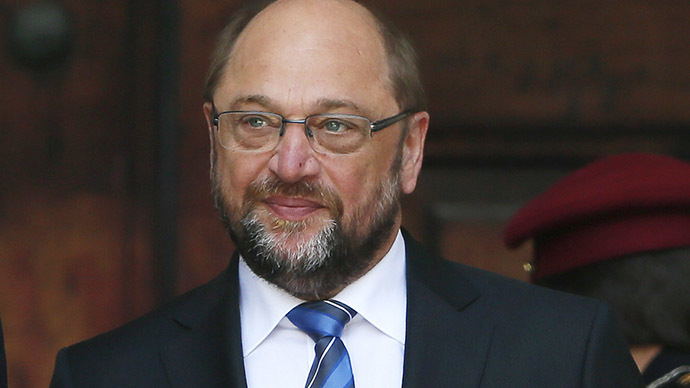
“Without new money, salaries won’t be paid, the health system will stop functioning, the power network and public transport will break down, and they won’t be able to import vital goods because nobody can pay,” he said.
Schulz, an archetypal Eurocrat, has never held high office in Germany. In fact, his biggest job in his homeland was as mayor of Würselen, a town near the Dutch and Belgian borders in Nord Rhein-Westfalen. Würselen has a population of 37,685. Nevertheless, this domestic non-entity has somehow managed to become the voice of Europe, in much the same way as previously obscure apparatchiks often suddenly became important in the old USSR, baffling western intelligence services. Schulz’s high-profile and huge power exposes the democratic deficit at the heart of the EU.
Schulz, who has not been directly approved by the European people, earlier called for the democratically elected Syriza government of Alex Tsipras to be replaced by similarly unelected “technocrats” like himself until “stability is restored.” His comments were a useful insight into the mentality that stalks the corridors of Brussels. A place where an elite with no mandate from the ballot box seem to believe they can do as they please.
However, Schulz is right about one thing. If the Greeks vote ‘No’ today, the countries’ financial system and public services will probably collapse in the short-term. However, if they vote ‘Yes,’ Greeks are merely prolonging a slow march to the abyss. Without debt relief or a default and reboot, Greece has no hope of a brighter future. The choice today is simply whether Greeks want their suffering to be slow and brutal or fast and cataclysmic. Europe in 2015. Schuman, Adenauer and De Gasperi would be appalled.
The statements, views and opinions expressed in this column are solely those of the author and do not necessarily represent those of RT.
The statements, views and opinions expressed in this column are solely those of the author and do not necessarily represent those of RT.







